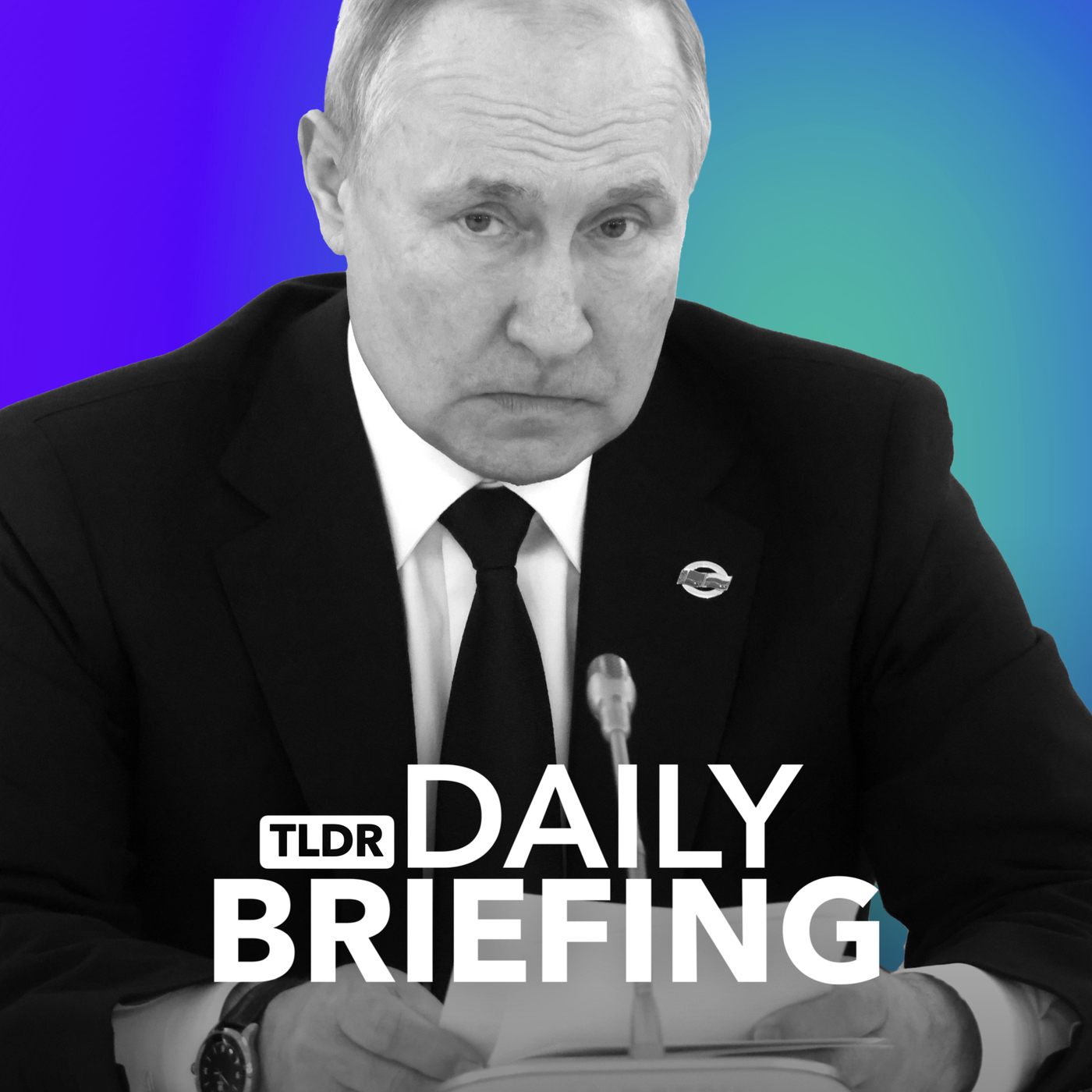
Deep Dive
- Russia fired an ICBM for the first time since the war began.
- Ukraine used British-made Storm Shadow missiles against Russian targets.
- The US temporarily closed its embassy in Kyiv due to potential air attacks.
- Russia's military doctrine has been adjusted, lowering the threshold for nuclear weapon use.
Shownotes Transcript
Today, Russia fires an ICBM for the first time in the Ukraine war. A US committee declined to release a report on Matt Gaetz. And an Indian billionaire is charged over a scheme to bribe Indian officials. From TLDR News, this is your daily briefing for Thursday 21st November 2024.
Our main story today is the major developments unfolding in Ukraine. In a significant escalation of the conflict, Ukraine has reportedly employed British-made storm shadow missiles against Russian military targets for the first time.
This action follows Ukraine's recent deployment of US long-range ATA CMS missiles, authorised by President Joe Biden, marking a decisive shift in the ongoing war. Eyewitness reports and Russian military sources confirm multiple missile strikes targeting areas in the Kursk region, although Russian air defences claim to have intercepted two missiles.
The conflict dynamics intensified during discussions among Western officials at the G20 summit, particularly concerning North Korean forces assisting Russia. UK Prime Minister Zakir Starmer emphasised the need for sustained international support for Ukraine, warning that a Russian victory would pose grave security risks in Europe and the Indo-Pacific. Meanwhile, the US is set to supply Ukraine with anti-personnel landmines to counter advancing Russian troops.
As tensions rise, Russian President Vladimir Putin's government has adjusted military doctrine, lowering the threshold for nuclear weapon use. A former Ukrainian defence minister told the FT that the authorisation to use the British missiles would not be game-changers on their own. It's unclear how many storm shadows have been given to Ukraine and how many it has remaining in its stocks. But the former defence minister said Kiev may not need that many if the targeting is done well and the overall planning is done well.
Meanwhile, Russia has launched an intercontinental ballistic missile today. It's the first known use in the war of such a powerful nuclear-capable weapon with a range of thousands of kilometres. The Ukrainian Air Force reported the launch after Ukraine fired US and British missiles at targets inside Russia this week, despite warnings by Moscow that it would see such action as a major escalation in the 33-month-old war. Russia has not commented yet in response to the statement.
Intercontinental ballistic missiles are strategic weapons designed to deliver nuclear warheads and were an important part of Russia's nuclear deterrent. The Ukrainians did not specify what kind of warhead the missile had or what type of missile it was.
There was no suggestion it was nuclear armed. The Ukrainian Air Force did not say what the missile had targeted and whether it had caused any damage. Yesterday in Kiev, the US has shut its embassy as a precaution because of what it called the threat of a significant air attack, but it's set to reopen today.
There's more on the way, but remember to subscribe and ring the bell for more Daily Briefing tomorrow. Plus, if you want to support the channel like a Data Odyssey, then consider joining the TLDR Daily Membership Programme for just £1.99.
A US congressional committee has declined to release a report detailing its investigation into alleged sexual misconduct involving Matt Gaetz, an appointee by Donald Trump for Attorney General. The House Ethics Panel convened Wednesday amid calls for Democrats and some Senate Republicans for the report's disclosure. However, many House Republicans pushed back, aiming to protect Gaetz from damaging revelations.
Michael Guest, the Republican chair of the Ethics Committee, confirmed the decision of the committee that, quote, there was not an agreement by the committee to release the report. Yesterday, the Washington Post reported that House Ethics Committee investigators had obtained records showing Gates had paid women for sex. A lawyer representing women who testified to the committee also told U.S. media outlets that one had witnessed Gates having sex with an underage girl.
As Trump prepares for his second term, Gates, a loyal Trump ally, stands out as a controversial choice for the position of Attorney General, which is raising concerns about the independence of the Justice Department. The investigation into Gates by the House Ethics Committee has been going on since 2021, making his nomination increasingly precarious.
Senate Democrats have demanded the files on Gates to be released. Led by Judiciary Committee Chairman Dick Durbin, the Democratic senators have urged the FBI to release its findings on Gates before the confirmation hearings begin. Indian billionaire Gautam Adani has been charged by U.S. prosecutors over an alleged years-long scheme to bribe Indian officials in exchange for favorable terms on solar power contracts that were projected to bring in more than $2 billion in profits.
Shares in Adani Group companies tumbled today after Adani, one of the richest men in Asia and a vocal supporter of India's Prime Minister Narendra Modi, was indicted in New York on charges including securities fraud. US federal prosecutors said more than $250 million in bribes were offered and promised between 2020 and 2024 to people in the Indian government as part of the scheme.
Seven others were indicted alongside Adani, which includes executives of Adani Energy Subsidies and former employees of a Canadian pension fund. Adani's nephew was amongst the indicted. The scheme was allegedly concealed from the US banks and investigators, from which they raised billions of dollars.
India's government did not immediately respond to a request for comment on the indictments. Adani's rise in the business world coincided with India's drive to harness private sector expertise and capital to develop infrastructure, which has accelerated during Modi's decade in power.
Moving to some tech news now. Alphabet, the parent company of Google, has been told that it may have to sell Google Chrome, its web browser, in order to end its monopoly over search on the internet. The proposal comes from the US Justice Department, who argued that Google's unlawful behaviour has deprived rivals not only of critical distribution channels, but also distribution partners who could otherwise enable entry into these markets by competitors in new and innovative ways.
As a result, Google will be highly regulated for around 10 years. Alongside selling Chrome, the DOJ have stipulated that they want Google to be banned from re-entering the browser market for five years, and that if they fail to meet the demands of the DOJ and restore competition, it will also have to sell off its Android mobile operating system. In order to tighten any potential loopholes, the DOJ also requested a prohibition on Google buying or investing in Search Rivals 2.
Now, it's worth stressing that this is simply what the Justice Department is asking the court to enforce, and nothing has yet been decided. Google will be able to present their proposal to the court in December. And finally, in today's uplifting story, we feature the winning images of this year's International Landscape Photographer of the Year Awards.
More than 3,600 photos from around the world were submitted to the competition, which is now in its 11th year. The overall winner was Andrew Milzinski from Canada, whose submission, Winter Cottonwoods, was taken at Cherry Beach, Toronto in Canada.
In second place was Ignacio Palacios from Australia with his photographs of the Yankala Canyon in northwest Turkmenistan and the Kono D'Arita mountain in Lapuna, Argentina. In third place was Jorge Popa from Romania with an aerial view of the Vanaturi Neamt Natural Park in Romania entitled Early Autumn.
Finally, special awards were given to Shirley Wung from Taiwan for her photograph Fireflies Flying in the Mist and Benjamin Barakat from Switzerland with a photo from Namibia entitled The Final Dune.
This is just one of many major stories going on, with 2024 marking a major year for both news and elections. In fact, with the majority of the world heading to the polls, 2024 has been a pretty unique and important year. So in the latest issue of our magazine Too Long, we discuss these elections, diving deep into the 29 biggest elections of the year, making sure you understand what really happened, and commemorating one of the biggest years in news.
We don't just discuss elections though, we also run through China's trade issues, Biden's successes and failures, the UK's new opposition leader and the state of the wars in Ukraine and Gaza. Plus the fact it's a magazine also means we're not constrained by the time limits or algorithms imposed by YouTube.
Unlike fleeting news cycles and algorithmic feeds, TooLong offers thought-provoking analysis and comprehensive coverage that's truly worth holding. Purchasing is also a great way to support the channel. Running TL;DR this year has cost just under £800,000, so if you've enjoyed our coverage in 2024, then picking up a copy of TooLong doesn't just get you high-quality reporting, it also allows you to invest in independent journalism.
and join us in shaping the future of news. If you're convinced, you have three more decisions to make. First, do you want a physical or digital copy? The physical is a high-quality 60-page perfect bound magazine shipped right to your door. The digital is slightly cheaper, especially if shipping is a concern.
Your second choice is the Standard or Premium Edition. The Standard is just a copy of the magazine, while Premium also gets you access to our monthly behind-the-scenes podcast, The Bullpen, where we break down all of the production of Too Long and TLDR more generally, and you'll get your name printed in the thank you section of the magazine. Finally, do you want to subscribe? If you do, you'll get a copy of Too Long every four months.
meaning you'll never miss an issue. Plus, you'll also get 25% off every copy as long as you stay subscribed. If you can, subscribing also gives us a reliable income stream, which is super useful for us. Regardless of which option you choose, you can buy a copy right now at too-long.news or click the link in the description. Thanks for your support and thanks for backing Too Long.
